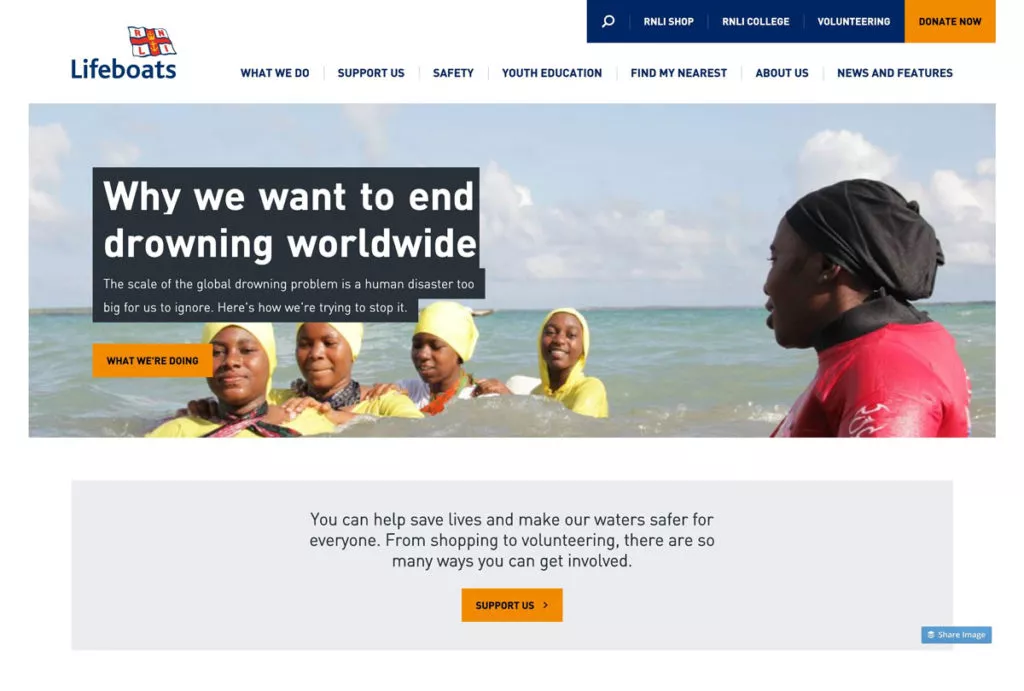How the Mail on Sunday’s criticism of RNLI backfired
At the weekend The Mail on Sunday highlighted the international work of the the RNLI. While it stoked up ire, outrage and racist comments, and plenty of claims that donations would be stopped, the ‘news’ item also generated outpourings of support for the charity, its work, and the way it responded to the criticism.
Below are just some of the different ways in which people challenged the Mail on Sunday and its reporting, or campaigning piece.
First, here is the article as posted to Mail Online on 15 September 2019 and updated later that day: RNLI buys burkinis for Africans as it axes 100 UK jobs: How £3.3million of donations to lifeboat charity are spent abroad including aid for Tanzania swimmers and creches in Bangladesh.
The article, based on a news item the previous day in The Times, linked the charity’s international work to the charity’s recently reported annual loss of £6.3 million and its plans to cut 135 jobs. It also managed to mention the salary of the charity’s chief executive, describing him as “the charity’s £189,000-a-year chief executive Mark Dowie”.
Advertisement
The MoS added that the RNLI’s “overseas spending has now soared from £1.13 million to £3.3 million over the past five years.”
Conservative MPs Andrew Brigden and Nigel Evans were quoted. The former argued that “‘It is the Royal National Lifeboat Institution, not the Royal International Lifeboat Institution.” The latter was concerned that the organisation was “risking the reputation of the charity” by training others in its lifesaving skills. He added: “I would say 99 per cent of the British public giving money to them have not the faintest idea it’s being diverted to projects overseas.”
With such a plethora of dog whistles presented, the public were more than happy to respond. You won’t have far to search to find the disgust, anger, and sense of betrayal that many people reported on being made aware of:
- how and where the RNLI spends 2% of its expenditure
- how it reports on it in its annual report and accounts
- how it mentions the countries that it works in on its Charity Commission registration
- how it shares updates with its supporters on its work
- how it shares updates publicly on this work via its social channels
- how it partners with the UK government’s DfID on these projects, including on matched funding
- how successful the projects are and why there is a case for expanding this work
At the same time, the vituperative quality of many comments and the threats to stop donations (cash, not much mention of direct debits, one mention of an upcoming legacy) stirred many others to come to the RNLI’s defence.
They did so from many different angles. Here is a selection.
1. It’s campaigning, not news
Scrutinising and rooting out wrongdoing and failures in charities is welcome, and newspapers have a valuable role to play in this.
But too many ‘news items’ are picking at threads in charities’ legitimate work, to see what might unravel. Chief executives’ salaries, ‘political correctness’ policies, helping refugees and people in other countries, and more. It’s clever, consistent, and powerful in the responses it generates.
“RNLI buys burkinis for Africans as it axes 100 UK jobs” as a news headline, as opposed to an opinion piece, is not news: it is campaigning journalism. And others are pointing this out.
‘News’ like this is not just about the RNLI.
It is about charities as a whole, and campaigning groups. Some made the link clear:
Others called out the racism of some people’s comments and of the tone of the two newspapers’ coverage:
[tweet no longer available]
2. Data, context and reason
Some of the assumptions of the Mail on Sunday’s piece and of some of those sharing their support for it were tackled.
For example, the founder of the RNLI had a global vision for its services from the very outset:
They spent less than 2% of their annual expenditure outside the UK:
The RNLI is a registered charity that has a history of partnering with government departments, and the Department for International Development in particular in these projects:
Both parties have been open about this:
LBC’s James O’Brien tried to elicit why one caller to the radio station was so angry at the RNLI’s overseas projects:
A quick look at the messengers:
[tweet no longer available]
[tweet no longer available]
Meanwhile, the RNLI was continuing to do what it does do every day:
[tweet no longer available]
3. Praise for RNLI’s response
The RNLI’s social media and press team worked hard to respond to questions and comments in a polite and professional manner, and this was recognised by many.
The charity thanked the many people that were moved to donate to show their support, and explained how others could do so.
The RNLI from the start defended its work and in particular its work overseas:
It even changed its front page at the weekend to draw greater attention to it:

As well as donations, many people simply gave their public support for the work of RNLI.
[tweet no longer available]
[tweet no longer available]
4. Why people support the RNLI
Plenty of people shared stories of what the RNLI means to them and why they support its work.
5. Charities show their support
Too often the charity that is target of the week has to defend its actions alone. This time other organisations came to its defence and showed solidarity.
Others in the charity sector were happy to point out their other UK charities undertake work internationally:
6. Stepping up to make up for lost donations
In cases like this it has hard to assess how many of those threatening to stop giving to the RNLI are indeed donors. Let’s assume that every single one of them was, and that would be reflected in the polite tone evident in the RNLI’s public responses.
Many others were so appalled by the article and/or some of the responses it generated that they decided to act quickly and positively – by donating to the RNLI.
Others pointed out how easy it was to show support by donating to RNLI:
Some even thought up some clever ideas to make such a response even more effective. Who is going to try and tackle this idea?
And here was another opportunity presented to one of the sources of the story, perhaps as a way to try to make amends:
7. Simple decency
The foul nature of some of the comments that the news reports generated was tackled and countered, often in very direct terms.
[tweet no longer available]
8. Humour and schadenfreude
It became clear that the Mail on Sunday’s attempt to stir up criticism of the RNLI was backfiring, with many people making donations to show their support and/or disgust at the newspaper’s actions.
Others have covered the reported rise in donations, although RNLI sources point out that it will be a few months before they have a firm sense of the scale of any increase, once future regular donations are received.
• RNLI donations surge after Tory criticism of its work overseas (The Guardian)
• RNLI Donations See ‘Sharp Increase’ Online Despite Backlash Against Overseas Projects (Huffpost)
Some managed to find some humour in the situation:
WATCH: Simon Scriver on “should you stop donating to the RNLI?”




